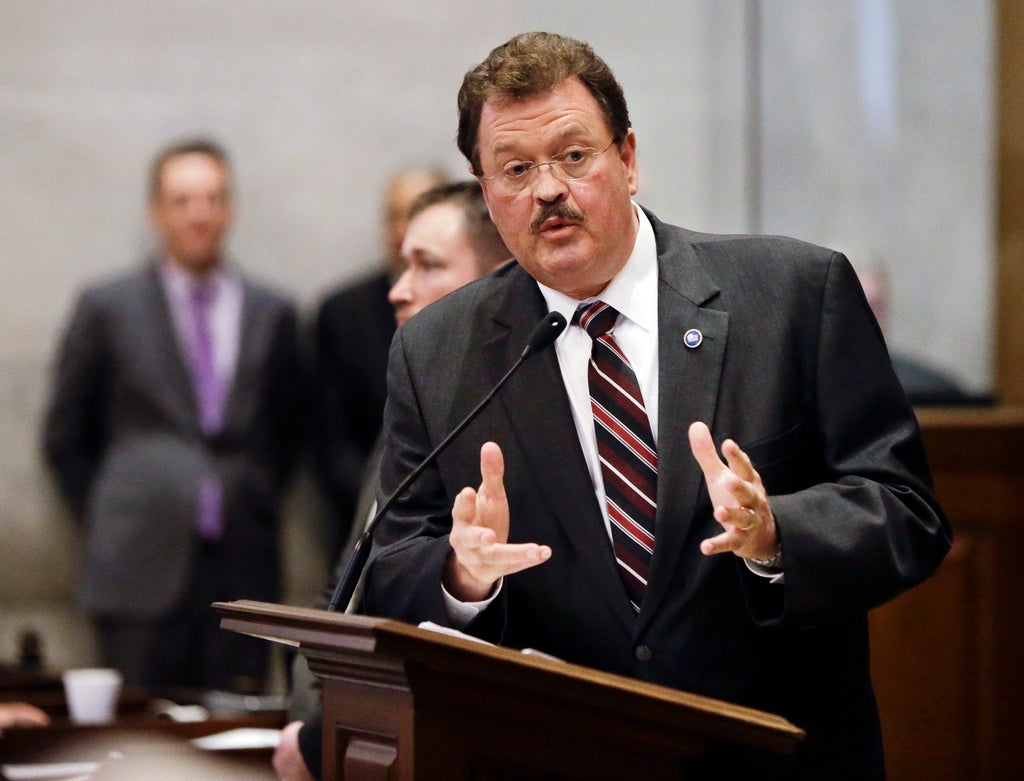
Before Tennessee’s Republican-dominated house voted for a bill giving officials greater control over public school libraries, state Rep Jerry Sexton floated a last-minute amendment to grant a politically appointed commission veto power over which books would be approved for students.
Democratic state Rep John Ray Clemmons asked “what are you going to do” with books that are banned.
“You going to put them in the street? Light them on fire? Where are they going?” he asked on 27 April.
“I don’t have a clue,” Rep Sexton answered, “but I would burn them.”
The moment has drawn widespread backlash and magnified the debate over the historic campaign to remove hundreds of titles from school libraries as part of a “parental rights” agenda dominating the GOP’s 2022 midterm campaigns.
Earlier this year, a rural school board in Tennessee’s McMinn County voted to remove the Pulitzer Prize-winning Holocaust graphic novel “Maus” from the district’s curriculum. Republican Governor Bill Lee also signed a measure into law requiring school libraries to post their contents online, subject to reviews to determine whether they are “age appropriate.”
The measures are among an unprecedented wave of legislation targeting US public schools backed by well-financed conservative groups and right-wing legal campaigns , including censoring books, classroom discussions and other teaching materials touching on racism, gender and politics – from restrictions targeting LGBT+ people and events or how LGBT+ students and their families can be reflected in classrooms, to blanket efforts limiting instruction on the impacts of slavery and civil rights movements.
A recent report from the American Library Association found 729 attempts to remove school materials last year, leading to roughly 1,600 book challenges and removals, the highest ever since the group began tracking the efforts two decades ago. Similar efforts in 2022 are likely to be even higher.
A report from PEN America found more than 1,100 titles were banned or investigated in 86 school districts in 26 states from July 2021 to March 2022, impacting more than 2 million students.
“These groups sought to pull books from school and public library shelves that share the stories of people who are gay, trans, Black, Indigenous, people of color, immigrants, and refugees,” according to the American Library Association report. “But we know that banning books won’t make these realities and lived experiences disappear, nor will it erase our nation’s struggles to realize true equity, diversity, and inclusion.”
Legislators and proponents of book censorship have accused schools of “indoctrinating” students about racism or “grooming” students, amplifying anti-gay rhetoric weaponised against LGBT+ people, often in concert with other legislation targeting schools over “critical race theory” and issues related to sexual orientation and gender identity.
“There is a growing tendency to label material in schools as ‘obscene,’ ‘pornographic,’ and a corresponding push by politicians, parents, and administrators alike to use these labels as justification for the swift removals of books as well as circumvention of normal reconsideration processes,” according to PEN America. “This is despite the fact that the books swept up in these bans would appear to fall short of any cognizable legal meaning of these terms.”
Opponents have often compared Republican-backed efforts to censor or ban school books to authoritarian regimes, conjuring images of Nazi Germany’s 1933 genocidal campaigns destroying tens of thousands of books considered politically subversive and “un-German”, making it all the more striking that an elected official in the US invoked the literal image of book burning.
President Joe Biden condemned politically motivated attempts to target schools and teachers during a White House event recognising teachers on Wednesday.
“There are too many politicians trying to score political points trying to ban books, even math books,” he said, referring to the Florida Board of Education’s rejection of math textbooks state officials claim contain “critical race theory.”
“Did you ever think when you’d be teaching you’re gonna be worried about book burnings and banning books all because it doesn’t fit somebody’s political agenda?” the president said.
Tennessee’s House Bill 2666, which passed the state Senate earlier this month, tasked a state textbook commission to issue guidance for schools when reviewing materials to ensure they are “appropriate for the age and maturity levels” of students.
The addition of a controversial amendment that would require the commission to issue a list of “approved” materials to schools sparked widespread backlash. That amendment was withdrawn.
But Rep Sexton put forth another amendment that would require the commission to review the contents of every public school library in the state and give it the authority to reject them entirely.
The full House version of the measure was approved by a vote of 66-26. State legislators must now iron out changes to the House measure and the parallel Senate bill before the legislature adjourns in the coming days.
“History hasn’t looked fondly on those who banned books or those who burn books,” Tennessee state Rep Gloria Johnson said during debate on 27 April. “I’m not sure that’s who we want to be included with.”
Rep Sexton later added that “we’re not banning books, we’re just removing them from the library.”







